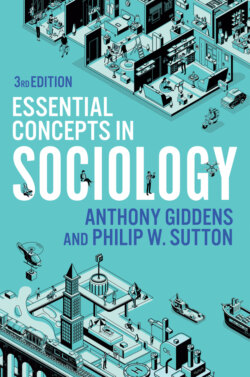Читать книгу Essential Concepts in Sociology - Anthony Giddens - Страница 16
Continuing Relevance
ОглавлениеBecause globalization forms the essential conceptual backdrop to sociology, it is present in an enormous range of recent research studies on diverse subjects, including transnational terrorism, social movement activity, conflict and war, migration studies, environmental sociology, multiculturalism and many more. As research has progressed, some of the unintended consequences of large-scale globalization have also been discovered. For instance, Renard’s (1999) study of the emergence and growth of ‘fair trade’ products found that, although globalization processes are dominated by large transnational companies, economic globalization also creates smaller gaps, or niches, which small producers can move into and develop based on shared values of fairness and solidarity.
Today the concept of globalization is widely accepted as part of the sociological mainstream and forms the backdrop to research in almost every specialist field of study. Roudometof (2020) argues that the concept is a key element within the contemporary vocabulary of the social sciences and public discourse more generally, which includes cosmopolitanism, hybridity, glocalization, transnationalism and interculturalism. Taken together, this complex of concepts enables sociologists to gain a firmer grasp of the major social and economic changes taking place beyond the level of single nation states. Roudometof sees this as the most important function of the concept of globalization, rather than the various attempts to arrive at an agreed theory of globalization and its positive or negative consequences.
Assessments of globalization differ markedly, but Martell’s (2017) evaluation returns to the familiar theme of inequality. He argues that, although many sociologists see globalization as partly or mainly a cultural phenomenon, we must acknowledge the key role played by capitalist economics and material interests. Martell takes issue with cosmopolitan theories of an emerging transnational political sphere, which he sees as overly optimistic. To the extent that it is real, globalization is uneven, reproducing existing inequalities and unequal power chances. Global free movement, for instance, means ‘those least in need – rich elites – being the most free, while those most in need of mobility – the poor and those beyond the rich core – are most restricted’ (Martell 2017: 251). Although cultural change is important, for Martell, capitalist economics remains the crucial driving force that is shaping the modern world.
